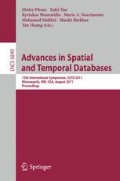Abstract
The Internet allows for near-total anonymity in online discussions and transactions; leading to challenges such as identity theft, spear phishing, cyber-bullying and lack of user-retailer trust for small online retailers. In an effort to restore prosperity, security and trust to our increasingly digitally interconnected society, it is important to tie some sense of the physical world in with the cyber world, e.g., creating a geo-coded Internet. However, geo-coding the vast amount of content currently on the web, along with providing reliable geo-location authentication services against the difficulties of spatial analysis and the inherent probabilistic estimate of current location-identification technology.
Access this chapter
Tax calculation will be finalised at checkout
Purchases are for personal use only
Preview
Unable to display preview. Download preview PDF.
References
Bruder, J.: In Groupons $6 Billion Wake, a Fleet of Start-Ups (2011), http://goo.gl/EsIhR
Guha, R., Kumar, R., Raghavan, P., Tomkins, A.: Propagation of trust and distrust. In: Proceedings of the 13th International Conference on World Wide Web, pp. 403–412. ACM, New York (2004)
The Washington Times, Internet traffic was routed via Chinese servers (2010), http://goo.gl/ZMais
Wikipedia, Social psychology (psychology) (2011), http://goo.gl/Aa46N
Wikipedia, SecurID (2011), http://goo.gl/aPA0Y
Wikipedia, CAPTCHA (2011), http://goo.gl/zkY53
Ferreres, G., Alvarez, R., Garnacho, A.: Guaranteeing the authenticity of location information. IEEE Pervasive Computing 7(3), 72–80 (2008)
Shekhar, S., Chawla, S.: Spatial databases: a tour. Prentice Hall, Englewood Cliffs (2003)
Güting, R.H., Schneider, M.: Moving objects databases. Morgan Kaufmann Pub., San Francisco (2005)
Mokbel, M., Ghanem, T., Aref, W.: Spatio-temporal access methods. IEEE Data Engineering Bulletin 26(2), 40–49 (2003)
Bogorny, V., Shekhar, S.: Spatial and spatio-temporal data mining. In: ICDM, p. 1217 (2010)
Author information
Authors and Affiliations
Editor information
Editors and Affiliations
Rights and permissions
Copyright information
© 2011 Springer-Verlag Berlin Heidelberg
About this paper
Cite this paper
Evans, M.R., Patel, C. (2011). Localizing the Internet: Implications of and Challenges in Geo-locating Everything Digital. In: Pfoser, D., et al. Advances in Spatial and Temporal Databases. SSTD 2011. Lecture Notes in Computer Science, vol 6849. Springer, Berlin, Heidelberg. https://doi.org/10.1007/978-3-642-22922-0_31
Download citation
DOI: https://doi.org/10.1007/978-3-642-22922-0_31
Publisher Name: Springer, Berlin, Heidelberg
Print ISBN: 978-3-642-22921-3
Online ISBN: 978-3-642-22922-0
eBook Packages: Computer ScienceComputer Science (R0)

